Suspected Israeli Airstrike Hits Iranian Positions In Syria
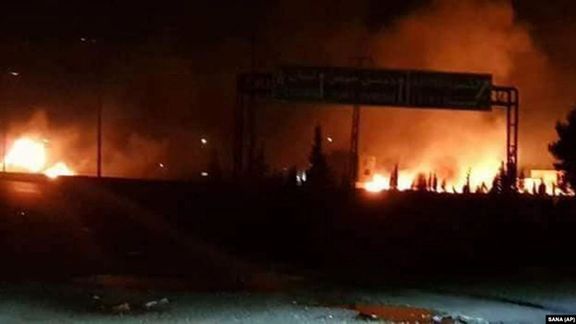
A Syrian airbase reportedly housing Iran-affiliated forces came under air attack just before midnight on Wednesday by what observers say were Israeli planes.

A Syrian airbase reportedly housing Iran-affiliated forces came under air attack just before midnight on Wednesday by what observers say were Israeli planes.
The official Syrian news agency SANA said one Syrian soldier was killed and three wounded in attack. The T4 airbase is located near the city of Palmyra.
The Syrian Observatory for Human Rights, a UK-based war monitor, said the airstrike hit targets controlled by Iranian forces, including the communication tower at the airport. The monitoring group said one Syrian soldier and three Iran-backed fighters were killed and seven others, among them three Syrian soldiers wounded.
It did not identify the nationality of the non-Syrian fighters.
Fars news agency in Iran, affiliated with the Revolutionary Guard (IRGC), reported the attack quoting the Syrian news agency without referring to any Iranian presence in the airport.
Since 2017, Israel has intensified air attacks against Iran-affiliated forces in Syria with hundreds of strikes so far. It rarely acknowledges the attacks but always maintains that it will not allow the Iranian military to entrench itself in Syria and pose a threat to Israel.
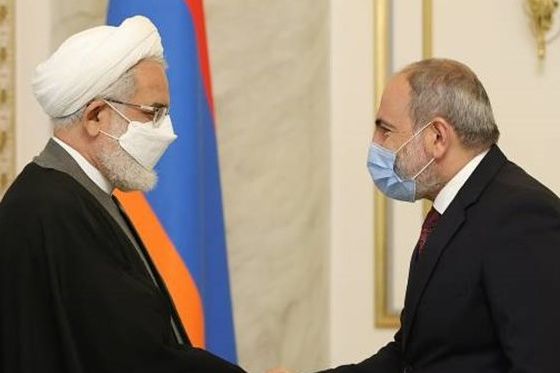
Baku freed two Iranian truck drivers whose arrest exacerbated tensions between the two neighbors that have simmered since last year’s Armenia-Azerbaijan war.
The move on Wednesday came a day after Iranian foreign minister Hossein Amir-Abdollahian spoke by phone with his Azerbaijani counterpart, Jeyhun Bayramov.
In a statement Wednesday, the Azeri foreign ministry said the two sides had agreed that recent " harmful rhetoric" did not reflect friendly bilateral relations. It stressed that disputes over transit roads should be discussed "directly by relevant government agencies," with the two ministers agreeing “the importance of alwaysrespecting the principles of territorial integrity and sovereignty.”
The Iranian foreign ministry reported Tuesday evening that Amir-Abdollahian had underlined that Tehran expected a resolution to the problem regarding transit routes. The ministry's website said Amir-Abdollahian had told his Azerbaijani counterpart that the two sides should not "allow enemies to disrupt" their mutual relations and that Bayramov had agreed to pursue the release of the truck drivers. The report said Amir-Abdollahian and Bayramov had agreed to visit each other.
Baku has restricted Iranian access to Armenia along roads it captured from Armenian forces last year, but Iran-Azerbaijan relations have been strained since the war, which deepened Tehran’s concern over the alleged presence of Israel and of jihadist militia recruited in Syria by Turkey close to Iran’s borders.
Since the arrest of Iranian truck drivers, officials and media in both countries have leveled harsh criticisms in strong language. Iran held extensive military drills near the border area after recent joint military drills between Turkey, Azerbaijan and Pakistan.
Iran’s Supreme Leader Ali Khamenei in a speech on 3 October warned about Israel's military presence in Azerbaijan and said regional countries should not allow foreign armies to interfere. He appeared to also accuse Turkey, an Azeri ally, of encouraging a standoff between Iran and Azerbaijan
Tehran is also seeking to bolster relations with Armenia, generally considered the loser in last year’s war. On three-day visit to Yerevan, Iran's Prosecutor-General Mohammad-Jafar Montazeri met Wednesday with Armenian Prime Minister Nikol Pashinyan, whose office in a statementsaid relations between Tehran and Yerevan were a "good base to resist all the challenges existing in the region.”
Iran's official news agency IRNA reported that Pashinyan had stressed the importance of implementing recent agreements reached with Iran's President Ebrahim Raisi (Raeesi) in Tashkent over renewing gas and electricity exchanges.
Some politicians and media in Iran have suggested a military pact with Armenia.
In a commentary headlined "Calm the turbulence north of Aras [River] with an Iranian military base" October 3, Javan newspaper strongly criticized Baku, for what it said was collaboration with Israel, and Ankara for alleged expansionist plans. The newspaper, which is affiliated to the Revolutionary Guards, suggested building an Iranian military base in Armenia's Syunik Province to guard against geopolitical changes.
"It appears that this would be a better way than continual military drills south of the Aras river," the commentary noted. The Aras divides Iran from Azerbaijan.
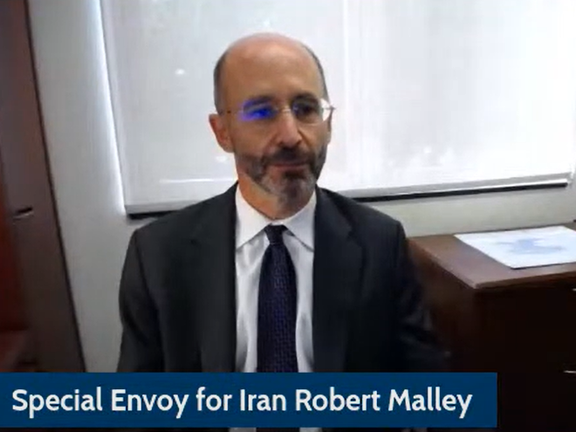
Rob Malley, the US special envoy for Iran, said Wednesday there had been “too much focus on the date” for resuming the Vienna nuclear talks with Tehran.
Malley said that the real issue was whether Iran had “a realistic view on how to come back into compliance with the deal.” Malley's statement about too much focus on the date for resumption of the talks comes as both top US officials, such as Secretary of State Antony Blinken, and European powers have in recent weeks emphasized that time is running out.
At the same time, he also used a tougher tone, reiterating that the US is ready to consider “all options” if Iran were not willing to return to the constraints of the 2015 nuclear deal.
Vienna talks between Iran and world powers, which began in April, was initially suspended since June pending transition to a new administration in Tehran after presidential election won by Ebrahim Raisi (Raeesi). But more than two months after the hardliner took office Tehran has not announced when it would return to Vienna.
In an interview with the Carnegie Endowment for International Peace, Malley stressed the benefits of reviving the 2015 deal − the JCPOA, Joint Comprehensive Plan of Action − while extolling the Biden administration’s cooperation with Israel and the Arab Gulf states, who opposed the deal.
Malley called the decision of former president Donald Trump to leave the JCPOA in 2018 “catastrophic.” He said that Iran’s steps in expanding its nuclear program since 2019 were ones “you could all reverse,” even if expansion would at some point be “irreversible.”
Calm things down
The envoy said a possible “longer and stronger” agreement with Iran could follow a revived JCPOA: “They [Iran] would like to get something more than the JCPOA…The best way forward is to get back to the JCPOA and then discuss ways of strengthening it and dealing with issues that remain very divisive between Iran and the United States. We think this would be to our mutual benefit, there are still things that Iran still wants in terms of sanctions and things that we still want…Let’s get back to the JCPOA to calm things down.”
Rather than expressing any toughening of the US position Malley said the Vienna talks accepted the JCPOA focus on Tehran’s atomic program: “That remains the equation, the equilibrium that remains on the table.”
The critics of the Biden administration’s Iran policy say that if the JCPOA is restored, without additional agreements and sanctions are lifted, Iran would have little incentive to discuss more restrictions on its nuclear, ballistic missiles or regional policies. Most JCPOA limits on Tehran’s nuclear activities will expire in a few years and then it could pursue a much expansive program.
Malley also said that the fate of four Americans jailed in Iran was “separate and apart” from the nuclear talks, on a “separate track.”
Discussions with Iran over the detainees were indirect, the envoy said, just like US participation in Vienna, where talks are based on JCPOA structures, which the US left under Trump. Malley conceded he found this frustrating.
“The Iranian refused direct communications, direct contact with us…[which] lends itself to misunderstandings, to delays…the negotiations would have been more effective had we been able to talk to the Iranians directly.”
But Malley insisted the Biden administration had offered confidence-building measures, and that all parties − Europe, Russia, China “and the Iranian negotiators themselves” – acknowledged “real progress” in Vienna. Malley said Washington continued to tell China that a revived JCPOA would help stabilize a region from which Beijing imported most of its oil.
A different path
Malley said it remained to be seen what path would be taken by a new Iranian administration “clearly stating that it wants to do things differently … [and] every day is making statements about how little was achieved” in Vienna.
“The Biden administration put on the table ideas which meant if Iran had negotiated, and reached this understanding, then sanctions…inconsistent with the JCPOA would have been lifted, and lifted very quickly,” he said. “That’s the choice Iran faces today: are they prepared to go back, or do they want to choose a different path?”
Malley said that close coordination with Israel and the Arab Gulf states − with the Saudi, Israeli and Emirati foreign ministers currently in Washington – recognized their “real reservations about the nuclear deal” and that Trump’s withdrawal had been “celebrated quite strongly in Israel.”
But Malley suggested that four rounds of Saudi-Iran talks and a “lively debate in Israel” were both positive developments.
“We will be prepared to adjust to a different reality in which we have to deal with all options to address Iran's nuclear program if it's not prepared to come back into the constraints [of the JCPOA],” he said.
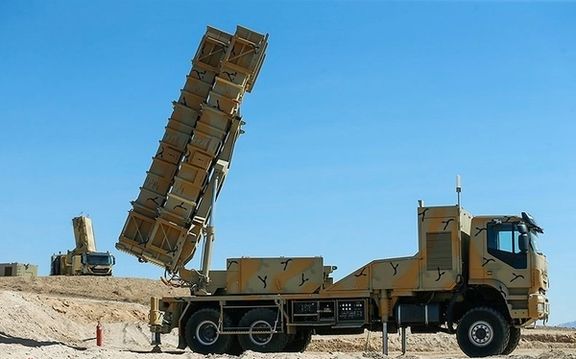
The commander of Iran’s Revolutionary Guard Aerospace Force has praised the use of homegrown technologies and young cadres in air defense drills this week.
General Amirali Hajizadeh was quoted by Fars news as saying that almost all radar and other equipment used in the drills on Tuesday and Wednesday were made in Iran, while 15 years ago “we were not in this situation”.
Hajizadeh explained that one purpose of the drills was to test newly trained cadres who must learn the nature of teamwork in air defense operations. He added that for the first time Iran used cruise missiles and winged munitions fired from aircraft to keep them under radar surveillance. He claimed that all incoming threats were neutralized.
On Tuesday, Brigadier General Ghader Rahimzadeh, commander of the joint air defenses headquarters (Army & IRGC) said the drills aimed to evaluate the impact of possible electronic warfare of an adversary on Iran’s air defense radars. He added that the exercise was successful in identifying targets in an “environment of electronic warfare.” He added that locally manufactured electronic warfare equipment is being used in this exercise. On Tuesday, jamming drones were used to test anti-aircraft interception systems and the stable operation of radars.
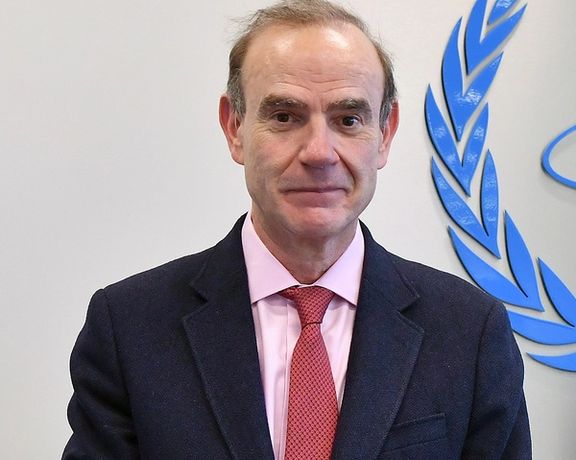
A pending visit to Tehran by the European Union's coordinator for talks to revive the Iran nuclear deal is vital to its future, France said on Wednesday.
The French foreign ministry also questioned the new hardline Iranian administration's commitment to salvaging the pact.
Enrique Mora, the EU's political director and EU coordinator in nuclear talks with Iran, is due to hold talks on Thursday with members of Iran's nuclear negotiating team almost four months after talks stalled between Iran and world powers, including the United States, to revive the 2015 deal.
"Through its statements and actions on the ground, the new Iranian administration of President (Ebrahim) Raisi raises doubts about its intention to return to the Joint Comprehensive Plan of Action (JCPoA)," French Foreign Ministry spokeswoman Anne-Claire Legendre told reporters in a daily online briefing.
"While refusing to negotiate, Iran creates facts on the ground that further complicate the return to the JCPoA. It is therefore in a context of crisis and at a critical moment for the future of the nuclear agreement that this trip by...Mora to Tehran takes place."
The Islamic Republic has repeatedly said it will return to the negotiations "soon" without giving any sense of what that actually means. Western diplomats have tentatively said a return to the Vienna talks may be possible before the end of October.
Legendre added that Tehran would also need to be clear about its intentions should it come back to the talks.
Since then-US President Donald Trump ditched the deal in 2018 and reimposed sanctions on Iran, Tehran has been rebuilding stockpiles of enriched uranium, refining it to higher levels of fissile purity, and installing advanced centrifuges to speed up production.
President Joe Biden aims to restore the deal but the sides disagree on which steps need to be taken and when.
Key issues include what nuclear limits Tehran will accept, what sanctions Washington will remove, whether there will be any guarantees and the prospect of follow-on talks on Iran's future nuclear program, regional and ballistic missile activities, diplomats have said.
"In line with recent regional and international consultations, I will host @eu_eeas Deputy Secretary General @enriquemora_ on Thursday," Iranian Deputy Foreign Minister Ali Bagheri Kani, who is expected to lead Iran's new negotiating team, said in a Twitter post on Wednesday.
"Exchanging views on bilateral & regional issues including Afghanistan, as well as talks on removal of cruel sanctions, are on the agenda."
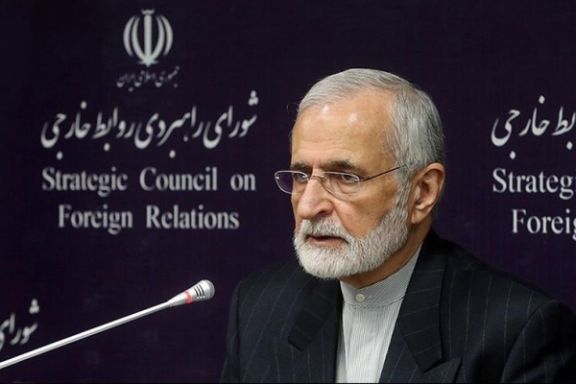
A top foreign policy advisor to Iran’s Supreme Leader Ali Khamenei has said relations with Afghanistan can be good if the Taliban respects Iran’s interests.
Kamal Kharazi, who heads Khamenei’s Strategic Council on Foreign Relations and was foreign minister 1997-2005 under reformist president Mohammad Khatami, told a website in Iran Wednesday that Tehran had no wish to interfere in Afghanistan’s internal affairs, if its interests were respected by the new rulers in Kabul.
Khamenei’s advisor mentioned Pakistan as the Taliban’s “main supporter,” and suggested that both Islamabad and the Taliban had an interest in Afghanistan’s new rulers moderating their behavior. Peace in Afghanistan and in the region could result if this happened, Kharazi said.
Iran cautiously accepted the Taliban takeover early on, hinting that the movement had changed since it controlled the country in the late 1990s and early 2000s. Tehran also saw United States withdrawal from Afghanistan as a strategic victory in its overall stated goal of ending the American military presence in the region.
Kharazi said Iran would closely watch events in the neighboring country for any signs of the reemergence of “terrorist groups.” Tehran regards both the Islamic State group (Isis/Daesh) and al-Qaeda as a danger for Shiites in general and Iran in particular.
He also called on the Taliban to curb drug smuggling to Iran, which has a porous border with Afghanistan. While some smuggled opium and other narcotics targets Iran, much is destined for foreign markets.
Kharazi most of all emphasized the security and rights of Shiites in Afghanistan. The Taliban have not been friendly toward Shiites, with dozens of bloody attacks against the community while they fought against US troops and the former Afghan government. Although some of these attacks went unclaimed or were attributed to the Islamic State, many in Afghanistan blamed the Taliban.
Iran “naturally has legitimate interests [in Afghanistan] that must be secured…[including] protection of the rights of Shiites and other groups and the preservation and the propagation of the Persian language, as part of the Afghan people’s heritage,” Kharazi said.
Given the Taliban are primarily Pashtuns, Kharazi’s concern for the Persian language is a defense of Tajik and Hazara communities whose mother tongue is Dari, an old and original dialect of Persian. Historically, Persian has been the main administrative and educational language in Afghanistan, benefitting from centuries of literature and scientific writings.
Kharazi emphasized that Iran’s policy toward Afghanistan would be “completely tied to the behavior of the Taliban.” If the new rulers “move toward an inclusive government, protection and security for all ethnic and religious groups, confront terrorism and adopt a policy of good neighborliness,” Iran was ready for cooperation and would assist Afghanistan with “all its experience and potential.”